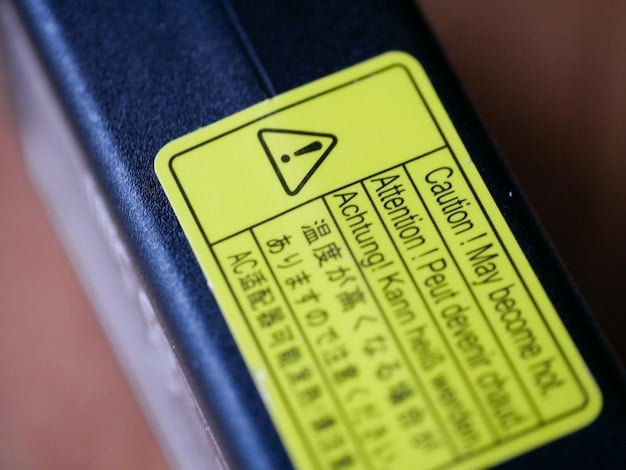Latest UL 9540 Requirements for US Residential Energy Storage

The latest UL 9540 certification requirements for residential energy storage systems in the US focus on enhanced safety, performance, and grid integration, addressing critical aspects like fire safety, battery management, and cybersecurity to ensure reliable and safe energy storage solutions.
Navigating the evolving landscape of energy storage can be complex, especially when it comes to safety and compliance. Understanding what are the latest UL 9540 certification requirements for residential energy storage systems in the US is crucial for homeowners, installers, and manufacturers alike.
Understanding UL 9540 and Its Importance
UL 9540 is a critical safety standard for energy storage systems (ESS). This standard evaluates the safety of energy storage systems, including batteries, inverters, and control systems, ensuring they meet rigorous safety requirements to protect homes and occupants. Compliance with UL 9540 is essential for ensuring the safe and reliable operation of energy storage systems.
What is UL 9540?
UL 9540 is a comprehensive standard that covers various aspects of energy storage systems, including electrical, mechanical, and thermal safety. It provides a framework for evaluating the design, construction, and performance of ESS to minimize the risk of fire, electric shock, and other hazards. The standard is regularly updated to address new technologies and evolving safety concerns.
Why is UL 9540 Certification Important?
Certification to UL 9540 demonstrates that an energy storage system has been thoroughly tested and meets industry-recognized safety standards. This certification is vital for:
- Safety Assurance: Ensures the safety of the ESS, reducing the risk of potential hazards.
- Regulatory Compliance: Meets local and national regulatory requirements for energy storage systems.
- Consumer Confidence: Provides homeowners with confidence in the safety and reliability of their energy storage systems.
- Insurance Eligibility: Many insurance companies require UL 9540 certification for home energy storage systems.

In conclusion, understanding UL 9540 and its importance is fundamental for anyone involved with residential energy storage systems, as it ensures safety, regulatory compliance, and consumer confidence.
Key Updates in the Latest UL 9540 Standard
The UL 9540 standard is continuously updated to reflect advancements in technology and address potential safety concerns. Recent updates focus on enhancing fire safety, improving battery management systems, and addressing cybersecurity risks. Staying informed about these updates is essential for manufacturers and installers to ensure compliance and safety.
Fire Safety Enhancements
Recent updates to UL 9540 include more stringent fire safety requirements to address the potential risks associated with battery systems. These enhancements aim to prevent and contain fires, protecting homes and occupants. Key updates include:
- Thermal Runaway Testing: Enhanced testing to simulate and mitigate thermal runaway events in battery systems.
- Fire Suppression Systems: Requirements for integrated fire suppression systems to quickly extinguish fires.
- Flame-Retardant Materials: Use of flame-retardant materials in the construction of energy storage systems.
Battery Management System (BMS) Improvements
Battery Management Systems (BMS) play a critical role in ensuring the safe and efficient operation of energy storage systems. Recent updates to UL 9540 emphasize the importance of robust BMS functionality:
- Overcharge and Over-Discharge Protection: Improved protection against overcharging and over-discharging of batteries.
- Temperature Monitoring: Enhanced temperature monitoring to prevent thermal runaway.
- Cell Balancing: Requirements for cell balancing to ensure uniform performance and longevity of battery cells.
By focusing on fire safety and BMS improvements, the latest UL 9540 standard aims to make residential energy storage systems safer and more reliable.
Specific Requirements for Residential Energy Storage Systems
UL 9540 outlines specific requirements for residential energy storage systems to ensure they meet stringent safety and performance standards. These requirements cover various aspects, including electrical safety, mechanical integrity, and environmental protection. Understanding these specific requirements is crucial for manufacturers and installers to design and install compliant systems.

Electrical Safety Requirements
Electrical safety is a primary concern in the design and installation of residential energy storage systems. UL 9540 specifies requirements for:
- Insulation: Ensuring proper insulation to prevent electric shock hazards.
- Overcurrent Protection: Implementing overcurrent protection devices to protect against short circuits and overloads.
- Grounding: Proper grounding to minimize the risk of electrical faults.
Mechanical Integrity Requirements
Mechanical integrity is essential for ensuring the durability and safety of energy storage systems. UL 9540 includes requirements for:
- Enclosure Design: Robust enclosure design to protect against physical damage and environmental factors.
- Vibration Testing: Vibration testing to ensure the system can withstand vibrations during transportation and operation.
- Drop Testing: Drop testing to evaluate the system’s ability to withstand accidental drops and impacts.
These specific requirements for electrical safety and mechanical integrity ensure that residential energy storage systems are designed and installed to operate safely and reliably in various conditions.
Navigating the Certification Process
Obtaining UL 9540 certification involves a detailed process that includes testing, evaluation, and documentation. Manufacturers must navigate this process carefully to ensure their energy storage systems meet all requirements and achieve certification. Understanding the steps involved and working with accredited testing laboratories can streamline the certification process.
Steps to Obtain UL 9540 Certification
The UL 9540 certification process typically involves the following steps:
- Application: Manufacturers submit an application to an accredited testing laboratory, providing detailed information about their energy storage system.
- Testing: The testing laboratory conducts comprehensive testing to evaluate the system’s compliance with UL 9540 requirements.
- Evaluation: The testing laboratory evaluates the test results and documentation to determine if the system meets the standard.
- Certification: If the system meets all requirements, the testing laboratory issues a UL 9540 certification.
- Follow-Up Inspections: Ongoing follow-up inspections to ensure continued compliance and quality control.
Working with Accredited Testing Laboratories
Choosing an accredited testing laboratory is crucial for a smooth and reliable certification process. Accredited laboratories have the expertise and facilities to conduct the necessary testing and evaluations. Key considerations when selecting a testing laboratory include:
- Accreditation: Ensure the laboratory is accredited by a recognized accreditation body.
- Expertise: Verify the laboratory’s experience with energy storage systems and UL 9540 certification.
- Turnaround Time: Understand the laboratory’s turnaround time for testing and certification.
By carefully navigating the certification process and working with accredited testing laboratories, manufacturers can efficiently obtain UL 9540 certification for their energy storage systems.
Impact on the Energy Storage Industry in the US
The implementation of UL 9540 has a significant impact on the energy storage industry in the US, driving improvements in safety, performance, and market acceptance. As more states and municipalities adopt UL 9540 as a requirement for residential energy storage systems, it becomes increasingly important for manufacturers and installers to comply with the standard. The standard also fosters innovation and competition within the industry.
Driving Safety Improvements
UL 9540 plays a critical role in driving safety improvements in the energy storage industry by:
- Establishing Minimum Safety Standards: UL 9540 establishes minimum safety standards for energy storage systems, ensuring they meet rigorous safety requirements.
- Promoting Best Practices: The standard promotes best practices for design, manufacturing, and installation of energy storage systems.
- Reducing Risk of Hazards: Compliance with UL 9540 reduces the risk of fire, electric shock, and other hazards associated with energy storage systems.
Enhancing Market Acceptance
UL 9540 certification enhances market acceptance of energy storage systems by:
- Building Consumer Confidence: Certification to UL 9540 builds consumer confidence in the safety and reliability of energy storage systems.
- Facilitating Regulatory Approval: Many states and municipalities require UL 9540 certification for regulatory approval of energy storage systems.
- Enabling Insurance Coverage: Many insurance companies require UL 9540 certification for home energy storage systems to be eligible for coverage.
The impact of UL 9540 on the energy storage industry in the US is substantial, driving safety improvements, enhancing market acceptance, and fostering innovation and competition.
Future Trends in UL 9540 Standards
As the energy storage industry continues to evolve, UL 9540 standards will likely adapt to address emerging technologies and safety concerns. Future trends may include enhanced cybersecurity requirements, expanded coverage of grid integration functionalities, and more stringent testing for extreme environmental conditions. Staying ahead of these trends is essential for manufacturers to remain competitive and compliant.
Enhanced Cybersecurity Requirements
With the increasing connectivity of energy storage systems, cybersecurity is becoming a growing concern. Future updates to UL 9540 may include enhanced cybersecurity requirements to protect against unauthorized access and data breaches:
- Secure Communication Protocols: Requirements for secure communication protocols to protect against hacking and data interception.
- Access Control: Enhanced access control measures to prevent unauthorized access to the energy storage system.
- Vulnerability Testing: Regular vulnerability testing to identify and address potential security vulnerabilities.
Expanded Grid Integration Coverage
As energy storage systems play a larger role in grid stabilization and management, future updates to UL 9540 may expand coverage of grid integration functionalities:
- Grid Support Functions: Testing and certification for grid support functions, such as frequency regulation and voltage support.
- Interoperability: Requirements for interoperability with grid management systems and other distributed energy resources.
- Grid Code Compliance: Ensuring compliance with local and national grid codes.
By anticipating future trends in UL 9540 standards, manufacturers can proactively address emerging challenges and ensure their energy storage systems meet the evolving requirements of the industry.
| Key Point | Brief Description |
|---|---|
| 🛡️ Safety Focus | Prioritizes electrical, mechanical, and thermal safety in energy storage systems. |
| 🔥 Fire Safety | Includes enhanced testing for thermal runaway and fire suppression requirements. |
| 🔋 BMS Improvements | Focuses on overcharge, over-discharge protection, and temperature monitoring. |
| 🌐 Grid Integration | Expands coverage for grid support functions and interoperability with grid systems. |
Frequently Asked Questions (FAQ)
▼
The main purpose of UL 9540 certification is to ensure the safety and reliability of energy storage systems, protecting homes and occupants from potential hazards, such as fire and electric shock.
▼
Manufacturers, installers, and integrators of residential energy storage systems in the US need to comply with UL 9540 standards to ensure their systems are safe and meet regulatory requirements.
▼
The UL 9540 standard is updated periodically to reflect advancements in technology, address emerging safety concerns, and incorporate feedback from industry stakeholders.
▼
Key areas covered by UL 9540 include electrical safety, mechanical integrity, thermal safety, battery management systems, and cybersecurity requirements for energy storage systems.
▼
Many insurance companies require UL 9540 certification for residential energy storage systems to be eligible for coverage, as it demonstrates compliance with recognized safety standards.
Conclusion
Understanding the latest UL 9540 certification requirements is essential for ensuring the safety and reliability of residential energy storage systems in the US. By staying informed about the standard and its updates, homeowners, installers, and manufacturers can contribute to a safer and more sustainable energy future.





